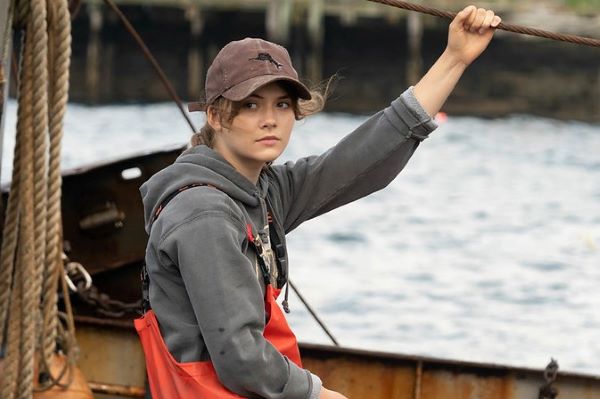CODA is coming-of-age story that plays a familiar tune in a fresh and interesting way. Second-time filmmaker Siân Heder (Tallulah) has adapted a French drama into a simple but hugely affecting story about a girl from a deaf family torn between her commitments at home, and following her dreams. Teasing superb performances from her cast, Heder overcomes the more generic, and stereotypically ‘Sundance’ elements of the tale to swing for the emotional fences with an earnest and authentic depiction of disability that makes up for some storytelling shortcuts.
Ruby (Emilia Jones) is a CODA, a child of deaf adults. As the only hearing member of her family of fishermen, she acts as their interpreter and the main face of the family to the ailing fishing community which seems to be a central industry to their small town. When financial problems bite, the family sense an opportunity to branch out away from the middleman who skim off practically anything profitable from their dwindling quotas. To do this, Ruby is a necessity in terms of communication. However, this coincides with a potential scholarship to a prestigious music school. She must decide whether she follow her dreams of becoming a singer, or whether to fulfil her responsibilities to her family.
CODA is a film that often works in spite of itself. It takes place in a certain gritty environment, but risks undercutting this with some perilously cliched and quirky characters like a flamboyant and mercurial music teacher, a sexually confident best friend, and the standard teen romance with fellow musician Miles (Sing Street‘s Ferdia Walsh-Peelo) that could have been stripped out entirely without anything being lost. Thankfully, Heder keeps her direction solid and unspectacular, leaving her central actors to take the dramatic weight and give the story a solid foundation of realism that its more whimsical, lightweight elements never come close to eroding.
What actors they are. Marlee Matlin (Children of a Lesser God) and Troy Kotsur are pure chemistry as Jackie and Frank Rossi, whose love and closeness as a couple has only deepened down the decades, perhaps bolstered by an ‘us against the world’ sense over their deafness. They love their daughter, but there’s a niggling resentment they are often unable to hide about how much they rely on Ruby. As Ruby, Jones delivers what could be a Winter’s Bone-level breakout. Hardened into stoicism and duty by habit, she is aware that her hearing sets her apart in intangible ways from Jackie, Frank, and brother Leo (Daniel Durant), who is also deaf. When she finally allows herself to begin to dream, Jones dances easily between her own resentment, her guilt, her ambition, and her delight at her burgeoning ability. It’s clear that the family dynamic has been workshopped and moulded into a wonderfully protean, shifting and vibrant organism that is a delight to watch, although it does occasionally bring the relatively generic moments into harsh focus.
Heder may set up her various plot strands in ways that allow for one clean and exemplary clove hitch when pulled taut, but there is nothing easy or trite in Ruby’s central quandary. At its core, this is a film – like so many others in which adolescence stumbles into adulthood – about connection and communication. But it has a huge impact as it relates to the deafness in Ruby’s family. Frank and Jackie are so used to their family being essentially hermetic and relatively isolated from their community that to lose Ruby would be a massive upheaval, even if they weren’t reliant on her to make a success of a new venture. That they are entirely unable to engage with her passion – they can’t even tell if she’s talented, pulls the central tension into the territory of heart-breaking. Heder unleashes the full effect of this in one extraordinary scene at a school concert, in which Frank and Jack’s physical isolation is emphasised, and, by extension, Ruby’s distance from her parents. This paves the way to a final act that pinpoints the gut in a way that could have been bluntly saccharine were it not played with the rawest conviction. Having the music of Joni Mitchell involved doesn’t hurt either.
CODA is gentle and heartfelt crowd-pleaser that, to be honest, quite often wallows in familiarity, but that works by dint sheer conviction and its insistence on a believable and compelling family at its core. Deafness becomes a central metaphor for the various lapses in communication that effect everyone, but it is in no way a cheap gimmick, instead used to ground the film when it threatens to float away into the indie ether. Set cynicism aside, and take its cheesier moments with a shot of brine, and CODA hits the sweetest of notes.
Screened as part of Sundance Film Festival 2021
